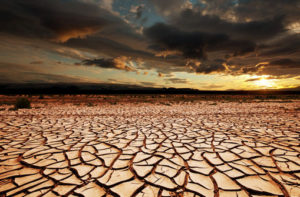Climate change in Africa could cost continent’s peace – Index
 While official government reaction to climate change remains slow, sub-Saharan Africa, the world’s least contributor to global greenhouse gas emissions, could be the most hit by climate change. According to the Global Peace Index 2019, the region has the least coping capacity for climate hazards, which could eventually exacerbate violent conflicts.
While official government reaction to climate change remains slow, sub-Saharan Africa, the world’s least contributor to global greenhouse gas emissions, could be the most hit by climate change. According to the Global Peace Index 2019, the region has the least coping capacity for climate hazards, which could eventually exacerbate violent conflicts.
This year’s Index indicates that climate change can indirectly increase the likelihood of violent conflicts through its impacts on resource availability, livelihood, security and migration. Sub-Saharan Africa also leads in areas with very high risk of a single climate hazard, with about 122 million at risk, the Index indicated.
Although not straightforward, however the impact of droughts, water shortages, weather disasters, all caused by an increasing imminent climate problem, impact resource availability, affect population dynamics and strain societal institutions, which affect socioeconomic and political stability, the Index, which ranks 163 independent states and territories according to their level of peacefulness, says.
In a 2018, April-June release of The UNESCO Courier, a magazine published by the UN organisation, it also made a case of a relationship between climate change and conflicts.
It said over time, climate change stresses on natural resources – combined with demographic, economic and political pressures on those resources – can degrade a nation’s capacity to govern itself.
A World Bank publication also notes how climate change will take a heavy toll on Africa’s road system.
“To ensure road spending delivers the best possible return and brings lasting development benefits, it is critical that investment plans take into account the consequences of a changing climate, as road assets are particularly vulnerable to climate stressors such as higher temperatures, increased precipitation, or flooding,” it said.
The Bank believes that virtually all models show that weather extremes will indeed put considerable pressure on Africa’s road system. The damage and accelerated aging of roads caused by climate change will require increased maintenance and more frequent rehabilitation.
“Aside from higher maintenance and rehabilitation costs, climate-related damage to the road infrastructure will also cause more frequent disruptions to the movement of people and goods, with direct consequences on economic productivity,” the Bank added.
Data from the Institute for Economics and Peace, publishers of the Global Peace Index 2019 shows, South Sudan, the Democratic Republic of Congo and the Central African Republic are at the highest risk of severe flooding.
In Somalia for instance, ongoing droughts linked to failed seasonal rains, have led to the death of livestock and displaced numbers of people.
“What was forecast to be an average rainy season in Somalia is now one of the driest on record in over 35 years,” Mark Lowcock, Emergency Relief Coordinator at the United Nations said in a statement regarding the humanitarian crisis in Somalia.
While most African countries depend heavily on agriculture, experts say droughts or loss of arable land, creates a situation where there is insufficient land for all forms of agricultural production, which can precipitate tensions among people over the use of such resources. Kenya’s 2017 droughts for instance, saw the migration of cattle herders to farms in Laikipia, in search of water and grass, ultimately causing destruction to lands and ensuing conflicts.
Like Kenya, the BBC reported in March this year of the killing of 130 persons as a result of the Dogon-Fulani clashes in Mopti, in central Mali.
A DW article in 2018 titled, West Africa: Fulani conflicts getting worse, said Mo Ibrahim, whom the publication described as a businessman and philanthropist, who uses his foundation to strive for good governance across Africa, said climate change is a driving factor to conflict escalations in the region.
“It happened in Darfur before, it’s happening now in Nigeria — it’s going to happen everywhere because you have two communities who, over hundreds of years, sorted out a certain mode of cooperation. Now with climate change, the herders need to drive their cattle into areas where they have never been before. And this requires sensitivity and quick action by governments to see how they can bring this community together. A new form of cooperation needs to be developed,” he was quoted as saying in the article.
Worst for a water problem, the United Nations Environmental Programme (UNEP), forecasts that, almost all sub-Saharan African countries would be water scarce by 2025. It may not just be a matter of conflicts over who uses what water is left, however, a water scarcity situation, may zone in recruitments to terrorist organisations. According to the Peace Index, the impacts of lack of water has also affected conflict dynamics in Nigeria.
“Lake Chad, a major source of fishing and farming livelihoods, lost 90 per cent of its surface area in the past 40 years due to climate change and environmental mismanagement. Resultant unemployment and related food insecurity contributed to Boko Haram’s successful recruitment of unemployed youths in the area,” the report said.
It is true that most parts of Africa have suffered or are still suffering wars or instability. Like the many insurgencies facing the continent, but climate change related conflicts, could begin to be experienced as new forms of warfare.
By Gifty Danso
Copyright ©2019 by Creative Imaginations Publicity
All rights reserved. This article or any portion thereof may not be reproduced or used in any manner whatsoever without the express written permission of the publisher except for the use of brief quotations in reviews.
